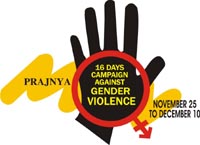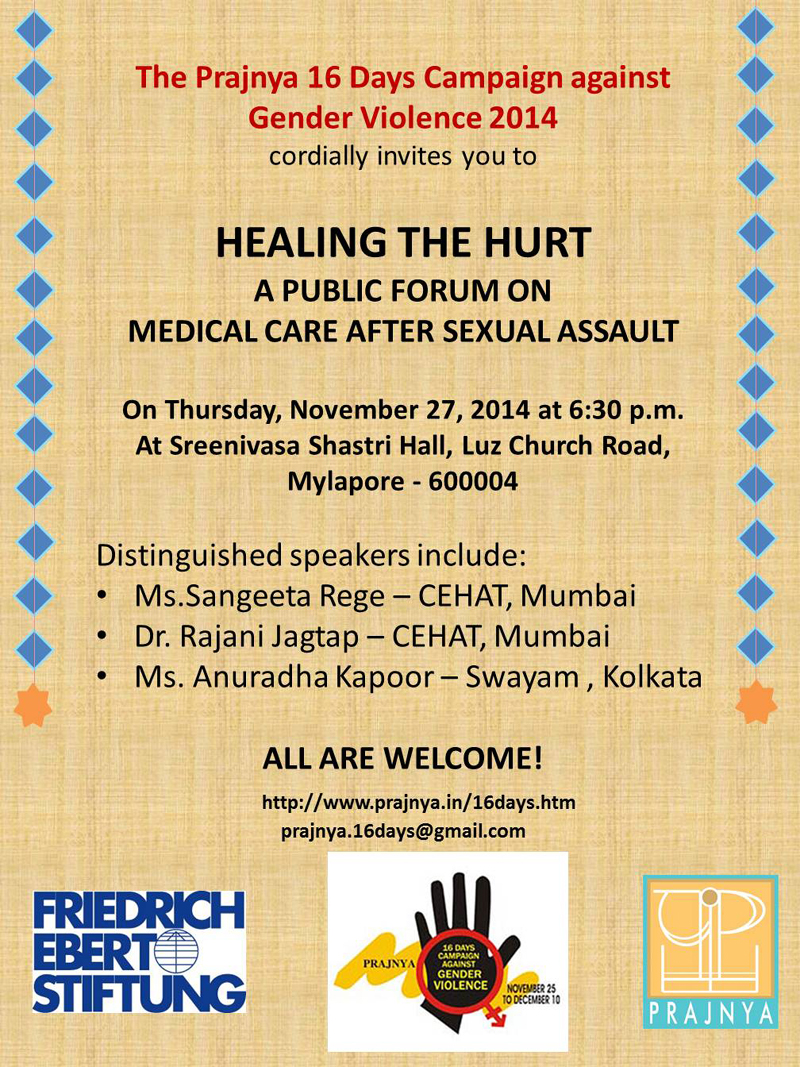
2014 PRAJNYA 16 DAYS CAMPAIGN AGAINST GENDER VIOLENCE
SPOTLIGHT: GENDER VIOLENCE AND PUBLIC HEALTH
This year, we are placing a spotlight on gender violence and public health with a series of programmes and conversations that make the case for getting gender and sexual violence onto the public health agenda as an urgent and legitimate issue.
There is uniform consensus that when a woman experiences violence of any kind, whether once or repeatedly, it has a definitive impact on her physical and mental health. There is considerable research that highlights the association between sexual violence and a long list of health outcomes including HIV infection, sexually transmitted infections (STIs), induced abortions, low birth weight, alcohol use, depression and suicide and physical injuries. Gender and sexual violence deny an individual the right to lead a healthy life, free of injury, illness and disease. There is therefore a real and urgent need to view violence against women as a public health issue, and not merely a criminal or law and order problem.
Health care professionals have a crucial role to play in recognising, recording and documenting instances of gender violence. Nurses, for instance, are often the first point of contact for someone who has experienced violence. Despite this, gender violence is rarely recognised as a public health issue, and there are few integrated, sustained responses or outreach programmes for health care professionals. There is little or no mention of the issue in medical curricula and training (for both doctors and nurses). As a result, health care professionals often do not have the necessary skills or the right attitudes in dealing with instances of gender violence.
Programmes in this Spotlight section of the 2014 Campaign will focus on the following key questions:
- How can we build the capacity of health care professionals to respond to violence?
- What are some best practices of health care system responses to gender and sexual violence?
- How can we help establish a sustainable mechanism within the health system to respond to violence?
Spotlight: Gender Violence and Public Health is organised over two days, November 27-28, 2014 and includes the following programmes:
- Panel discussion with doctors at a prominent private teaching hospital. (Closed)
- Healing the Hurt: A Public Forum on Medical Care after Sexual Assault (Public event) Report
- Roundtable: The Gender Violence-Health System Interface: Practices, Guidelines and Protocols. (By invitation)
Our resource people for the Spotlight programmes include:
- Sangeeta Rege from CEHAT (Centre for Enquiry into Health and Allied Themes), Mumbai.
- Dr. Rajni Jagtap from CEHAT (Centre for Enquiry into Health and Allied Themes), Mumbai.
- Anuradha Kapoor from Swayam, Kolkata.
Spotlight: Gender Violence and Public Health is organised in partnership by FES India and Prajnya.
Gender Violence: The Health Impact
This blog symposium serves as a companion to the Spotlight segment. It seeks to frame gender-based violence in all its forms as a public health issue that affects all sections of the population and analyses its health impact from a physical, reproductive and psychological viewpoint. In addition, the symposium will critically examine the emergency health care responses and protocols that exist to combat gender and sexual violence including the attitudes of health care professionals with a gaze that moves from “what is” to “what should be” and locates this discussion within a framework that is firmly survivor-centric and rights-based.
Resource creation is one of the most important aspects of the Prajnya 16 Days Campaign against Gender Violence. Since 2012, the blog symposium has been an important part of this work. Our blog symposia are a collection of perspectives on a given issue, published online, where writers, publishers, editors and literary critics reflect on how sexual and gender violence is portrayed or represented in literary works. The posts are featured on the GRIT blog, and indexed there and on the Campaign blog.
